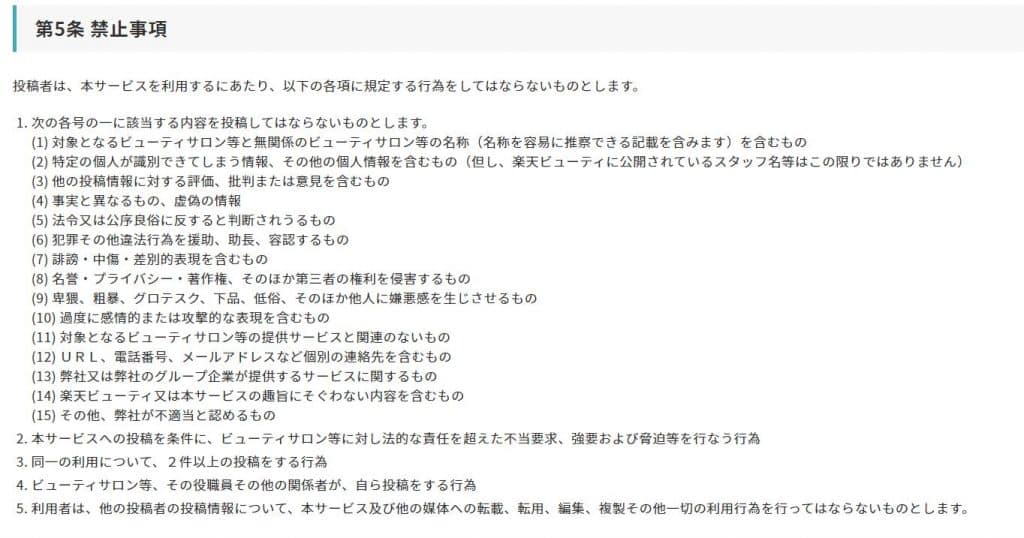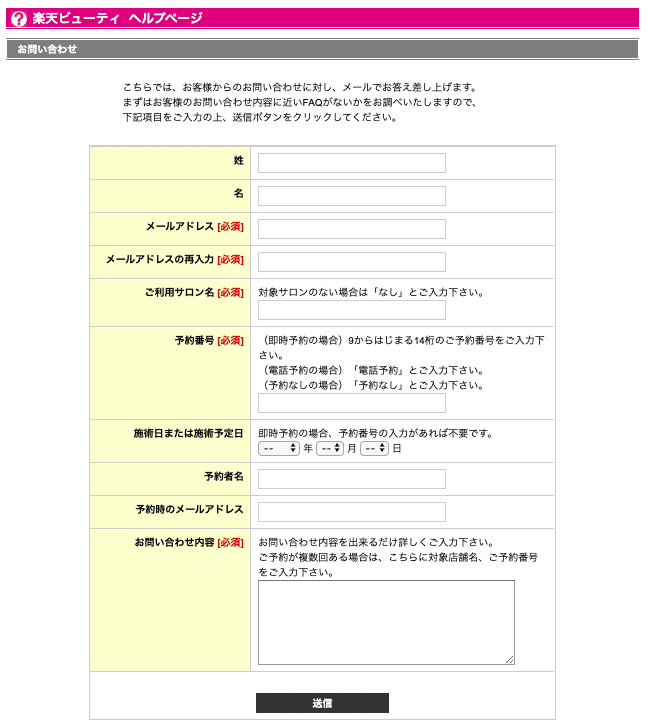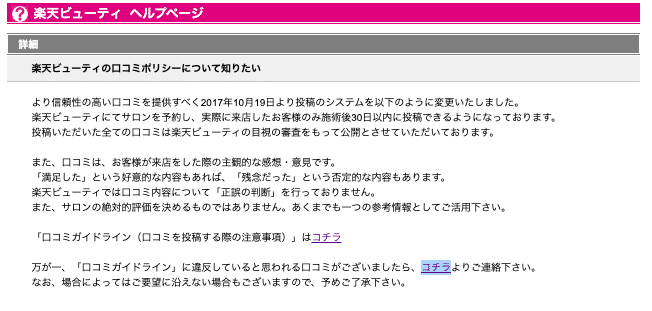How to Remove Malicious Reviews on Rakuten Beauty

What is Rakuten Beauty?
Rakuten Beauty is a hair salon and beauty salon search and reservation site operated by Rakuten Inc. Here, you can search for beauty salons and make reservations for the ones you like. You can make reservations by phone or online through the site, and the types of salons available range widely, including not only beauty salons but also esthetic salons, nail salons, and eyelash extension salons. One of the biggest features is the point service, Rakuten Points, which can be said to be the industry’s largest. For those who frequently use Rakuten-affiliated sites and stores, the ability to accumulate and use Rakuten Points across various services is a major attraction. Since there is also a smartphone app, it is believed that many women and Rakuten members search and make reservations here.
What are the Negative Reviews Posted on Rakuten Beauty?

The salon information posted on Rakuten Beauty is primarily provided by the salons themselves, so the main place to find actual user feedback is in the review section. While the comments are generally positive, as a review site centered around user posts, negative reviews can also be posted. In this article, we will explain the content of potential negative reviews and reputational damage that can be found in the review section of Rakuten Beauty.
Reviews Expressing Dissatisfaction with the Treatment
The first type of review that comes to mind is one expressing dissatisfaction with the treatment. Reviews such as “I asked them to style my hair in a certain way, but they cut too much off. The salon seemed busy, and they didn’t color my hair the way I wanted, so I didn’t get the finish I liked” can damage the reputation of the hairdresser and are undesirable for the salon. However, the judgment of “it didn’t turn out the way I wanted” is based on the user’s subjective opinion, making it difficult to draw the line between whether it contradicts the facts or is defamatory. Moreover, such reviews can also be considered useful information for those reading the reviews. It becomes difficult to decide whether such reviews should be deleted. However, depending on the case, reviews that include definitive expressions such as “you should definitely not go” or “the worst”, contain defamatory expressions, or state facts that contradict the truth (such as using the hair dye as instructed by the user) may be subject to deletion.
Reviews Containing Criticism of Other Posts
Next, let’s consider a review that criticizes another person’s review, such as “The post below is definitely a shill! Don’t believe it. This salon is the worst, the complete opposite of the previous review!” Calling a review that a customer took the time to write a shill is not only rude, but it also significantly lowers the salon’s rating. Such reviews should be deleted promptly.
Reviews Containing Malicious Expressions or Defamation
Another type of review to consider is one that includes malicious expressions or defamatory descriptions. For example, a review might say, “The hairdresser at this salon, A, is disgusting, touching my chest during the shampoo and other forms of sexual harassment.” If this is not true, it defames a specific individual or salon and should be deleted promptly. Rakuten Beauty reviews all review content visually before posting, so blatant defamatory posts are rare. However, since the review process is manual, posts containing defamatory or malicious expressions may remain. For those who may suffer damage to their reputation or other harm due to such posts, prompt deletion is desirable.
How to Request Removal for Violation of Terms of Use
Rakuten Beauty ‘Review’ Terms of Use
Rakuten Beauty has a set of terms of use for reviews. Article 5 of these terms lists the actions that are prohibited in reviews. Posts that violate these terms are often not published during the review process. Even if they are published, they are likely to be subject to removal.

How to Request Removal
At Rakuten Beauty, you can request removal through the contact form on the help page.

Example of Requesting Removal for Violation of Terms of Use
First, fill in the necessary information according to the form. Follow the instructions on the form and enter the name of the salon where the review is posted. In the inquiry content field, specify which review you are referring to, so that Rakuten Beauty can easily identify it. For example, let’s consider a case where there is a review that criticizes another post, such as “↓The post below is definitely a shill! Don’t believe it. This salon is the worst, the complete opposite of the previous review!” You could write the following in the explanation field:
Thank you for your attention. I am △△, the manager of Beauty Salon 〇〇. I would like to request the removal of this review.
This review states that the review by B, which is one post before this one, is a ‘shill’, but this is absolutely not true. B was satisfied with our salon and posted a review. This review is not only disrespectful to B, but also damages the image of our salon. Moreover, it falls under ‘evaluation, criticism, or opinion on other posted information’ in Article 5, Paragraph 1, Item 3 of the Review Terms of Use. Such posts have a negative impact on our business, so we would like to request their removal. Thank you for your understanding.
Rakuten Beauty clearly states that posts that violate the Review Terms of Use will be removed. Therefore, if you can prove a violation of the terms, there is a high likelihood that the post will be removed. If your removal request is not honored, you can request Rakuten Beauty to take measures to prevent transmission, or consider filing a lawsuit. These are legal matters, so you can either handle them yourself or consult with a lawyer. Be careful when entrusting the removal to a third party other than a lawyer, as it may lead to a violation of the law.

Requesting Removal on the Grounds of Illegality
Legal Measures Available
If the content infringes on rights or violates the law, you can dispute the removal through a lawyer in court. The legal measures that can be taken in relation to online reputation damage control can be broadly divided into:
- Request for voluntary removal through transmission prevention measures
- Request for post deletion and provisional disposition
- Request for disclosure of sender information (disclosure of IP address, name and address)
- Claim for damages (claim for damages after identifying the poster)
Among these, the requests directly related to deletion are the request for transmission prevention measures, the request for post deletion, and the application for provisional disposition.
Legal Claims to Make
So, when making a legal request for deletion, the first thing to consider is to make a claim of “defamation”. Defamation is established when there are facts that meet all of the following:
- “Publicly”
- “Indicating a fact”
- “Damaging a person’s reputation”
For example, if a review is posted saying, “The hairdresser A at this place is disgusting because he sexually harasses me by touching my chest during shampooing,” let’s look specifically at whether it meets the requirements 1 to 3. First, posts on review sites like Rakuten Beauty, as in this case, can be said to be “public” because they are placed in a state where an unspecified number of people can view them on the Internet.
Next, “indicating a fact” means stating a specific fact that is sufficient to lower a person’s social evaluation, regardless of whether it is true or false. In this case, the content is that “I was sexually harassed by touching my chest,” and such content indicates a fact that violates the law, such as the hairdresser committing sexual harassment, and can be said to be sufficient to lower the hairdresser’s social evaluation.
Finally, to “damage,” it is sufficient if there is an abstract risk of damage to social evaluation, and it is not necessary for the reputation to be actually infringed. It is not necessary to prove that the post in question was viewed by an unspecified number of people on Internet news and SNS, and that criticism and protests flooded the salon. It is enough to say that there is an objective risk.
Please refer to the following article for detailed requirements for defamation.
https://monolith.law/reputation/defamation[ja]
Also, it is possible to argue that the expression “disgusting” constitutes “insult” and that revealing the hairdresser’s personal information constitutes an invasion of privacy. It would be a good idea to consult with a lawyer about what kind of claim would be best to make.
Removal through the Court Process (Provisional Disposition)

When seeking removal due to legal violations such as defamation, the usual first step is to request a transmission prevention measure. However, this is a method of requesting removal without going through the courts, asking for voluntary removal by Rakuten Beauty. As it is a discretionary measure, depending on the judgment, removal may not be carried out. In contrast, in the court process, if removal is approved in court, a binding force arises from the judgment, and Rakuten Beauty will be compelled to comply with the removal. Therefore, if the transmission prevention measure is not approved, it is effective to transition to the court process. Provisional disposition is a method stipulated in the Japanese Civil Preservation Law, which seeks temporary measures before obtaining a final judgment by formal litigation when a quick resolution is required.
In cases like this, where there is slanderous or defamatory reviews, once they spread, there is a high risk of incurring irreparable damage. Therefore, it is effective to seek immediate removal of the information by using the provisional disposition system, along with filing a lawsuit. When a provisional disposition order is issued, the court orders the other party to remove the post, so the other party will comply with the removal. In the case of provisional disposition, if you consult with a lawyer who has expertise in reputation damage measures, in many cases, it can be realized in about 2-3 months from the request to removal. It can be said to be an effective measure. For more detailed explanations about the removal of the relevant articles in case of slander or reputation damage, and the procedure of provisional disposition, please refer to the article below.
https://monolith.law/reputation/provisional-disposition[ja]
Identification of Posters through Provisional Dispositions
If you seek the assistance of a lawyer for the identification of posters through provisional dispositions, it is possible to disclose information such as the poster’s IP address through a so-called sender information disclosure request. This could potentially lead to the identification of the poster. Once this is done, you can seek damages for the harm caused by defamatory posts from the identified sender. The flow of these procedures is explained in detail in the article below.
https://monolith.law/reputation/disclosure-of-the-senders-information[ja]
Summary
Rakuten Beauty conducts a review before posting reviews, making it a site with few malicious posts. However, this review is not to verify the accuracy of the content, but is merely a formal review, so undesirable reviews may still be posted. Nevertheless, it may be possible to resolve the issue by taking legal measures as mentioned above, even if a request for deletion is not accepted. The method and argument to be used, and whether deletion will be granted, varies depending on the individual case. In any case, claiming illegality involves specialized content and methods, making it difficult for individuals to handle, and it also involves legal actions, so the help of a lawyer is necessary. First, consult with a lawyer to determine whether the review in question infringes on rights or violates the law.
Category: Internet





















